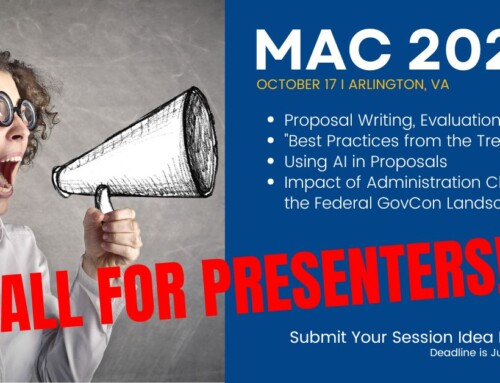by Hélène Courard, APMP-NCA Vice President, JD, CF APMP Fellow
As a proposal professional, it should come as no surprise that I believe the approach to one’s career development should be driven in the same way as proposal development. Just as you would never start writing a proposal without having developed a proposal development plan and associated outlines, you cannot expect to reach your professional goals without putting some thought into defining what your goals are and determining what steps you need to take to get there. But, unlike a proposal where the objectives are provided to you by the client, when it comes to your career, you are responsible for defining what you want to be when you grow up.
So, how do you figure out where you want to go with your career? This is the standard “Where do you want to be in three, five, and 10 years?” Question.
While some people have a very clear long-term vision (e.g., I want to be a director of a large proposal organization in 10 years, or I want to progress from proposal coordinator, to proposal manager, to capture manager in 15 years), it is more likely that you don’t know where you want to be in the 10- to 20-year timeframe. If we are honest, most of us in the proposal industry did not begin our careers even knowing this industry existed, much less with a specific goal in mind.
For those of you who know my background (or have read my bio), you’ll note that I have my law degree. I practiced telecommunications law for five years before I switched careers and “fell” into the proposal industry. I went to law school for many reasons, including (in no particular order) (1) I loved school, and I was good at it; (2) I loved (and still love) precise language and a well-crafted, exact argument; and (3) as a naturalized U.S. citizen, I am passionate about the constitution and the principles upon which this country was founded. After five years in the trenches, though, I realized that while I love the law, I am decidedly not fond of the law firm 80-100+ hour workweek lifestyle.
I didn’t know what I wanted to do—or what I was qualified to do. With the help of a fantastic career coach, I was able to determine that the skills and abilities I loved about my legal career
were very similar to those needed in proposal development. Voila! Another proposal wonk was born! Seriously though, it took about six months of intense research and introspection to find my new path. Through this experience, I found that the absolutely best way to determine your career goals is via a lot of informational interviewing. Informational interviewing is simply the process of interviewing a lot of people in various jobs or fields that seem interesting to you to determine whether it is a career path you would find fulfilling and can be successful
in. Why does it work? People like to talk about themselves. And they love when someone shows an interest their personal career path.
The key to informational interviewing is that you are not interviewing for a particular job, you are just exploring the career. This removes a lot of pressure on both sides of the discussion. The person you are speaking with is more willing to meet with you and is more open about the realities of the field because you are not asking for a job. Meanwhile, I was free to ask a lot of questions I wouldn’t normally ask in a job interview when I would be more focused on trying to make a good impression. Instead I could be direct to explore what the field was about—the good, bad, and ugly—because I was on equal footing; simply assessing whether the role would be a good fit for me.
So how do you do it?
- Identify people in your network—including colleagues, leaders in your firm, people you meet in the course of your job from other companies, or people you meet in your professional networks like APMP or school alumni groups. Reach out to them and ask them if they wouldn’t mind giving you 30 minutes of their time to talk about what they do and how they got there.
- Ask some basic, routine questions—What is a typical day like for them? What part of their job is really fulfilling? What are some of the drawbacks? What was their path into that role? What skills do they think are essential for developing into a successful [fill-in-the-blank]?
- Network, network, network—The last question I would ask everyone I spoke with was whether they could connect me with one or two other people in
a similar field who they thought I should also talk with. This was invaluable in exploring complementary fields in an industry as well as in growing my network. I am still in touch today with some of the folks I met on that journey. Today, nearly 20 years later, I can reach out to a vast network of people in
a diverse set of industries that gives me perspective on the interrelatedness of so many exciting fields.
Of course, my career change and subsequent growth in this industry requires a lot of research and introspection. It is critical to understand what feeds me and drains me, where my strengths lie, what my weaknesses are, and how to overcome them or minimize their effects. However, I still use informational interviewing today as I evaluate my next steps on my career path. By far, informational interviewing has been the most effective tool in my professional development.




Leave A Comment